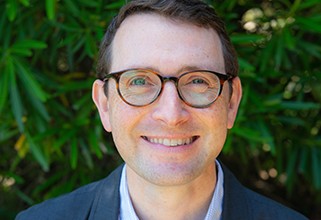Clergy Column by Rabbi Heath Watenmaker

Harvesting a Spirit of Renewal
June/July 2024
Welcome to summer! In many ways, June feels like a month of renewal. There are (usually) more sunny days than dreary days; the days are warm, the afternoons are cool and breezy. For many, it’s a time to take a breath and find moments to delight in nature and a few moments of respite. This sense of rest and renewal is tempered, these days, by the brokenness and hateful rhetoric that sometimes feels as if it’s all around us in our world. But still, our Jewish calendar calls us to take a breath and consider this moment of renewal.
June also brings the holiday of Shavuot, literally the “Feast of Weeks,” which commemorates the revelation of Torah to the Israelites in the wilderness of Sinai. Shavuot gets its name from the culmination of seven weeks of counting the Omer — the time in which Jews count from the moment of redemption (Passover) to the moment of revelation (Shavuot) — seven weeks, plus one day (Shavuot is the 50th day after Passover). In Jewish tradition, Shavuot actually goes by four different names, reflecting the various themes of the holiday. First is Chag HaKatzir (Harvest Festival) that is a reminder of the holiday’s agricultural basis, which marked the beginning of the wheat harvest. Another name is the one that’s most familiar to us, Chag HaShavuot (Feast of Weeks), again, connected to the counting from Passover. Then there’s Chag Matan Torah (Festival of the Giving of the Torah), connected to the moment in which the Israelites received Torah at Mount Sinai. And finally, Chag HaBikurim (Festival of the First Fruits). This last name is connected to the Torah’s instructions that tie the offering of first fruits to Shavuot: “On the day of the first fruits (bikkurim), your Feast of Weeks, when you bring an offering of new grain to Adonai, you shall observe a sacred occasion.” (Num. 28:26)
This ritual seems to affirm two important truths: first, the deep sense of renewal and possibility tied to Shavuot; and second, a reminder of God’s role (or, perhaps, a reminder of maintaining awe for the natural world beyond our control) as a partner in agriculture. In other words, we were to give thanks for successful harvests that arrived in the late spring/early summer, and also had to maintain some sense of humility. No matter how advanced the Israelites might have been, agriculturally, they still recognized that there were many important factors beyond their control, and they had to maintain a healthy sense of humility and appreciation for these external factors. Later, in Deuteronomy, as Moses is laying out the social constructs that will govern the Israelites as they prepare to enter the Promised Land, God provides more detail for this ritual of offering first fruits:
When you enter the land that Adonai your God is giving you as a heritage, and you possess it and settle in it, you shall take some of every first fruit of the soil, which you harvest from the land that Adonai your God is giving you, put it in a basket and go to the place where Adonai your God will choose to establish God’s name. You shall go to the priest in charge at that time and say to him, “I acknowledge this day before Adonai your God that I have entered the land that Adonai swore to our fathers to assign us.” (Deuteronomy 26:1-3)
These first fruits were a symbol of God’s promise coming into fruition (literally), and an opportunity to offer a bit of the product of our labors as an offering of thanks and appreciation. So too, in this season of receiving Torah and giving first fruits, how are we called to consider the ways in which we show appreciation for our own gifts? How do we make time and space to appreciate that which is new in our lives? How do we show our gratitude and appreciation for what we have, and how do we recognize all the factors that contribute to our success?
I’ll end with this meditation for the Hebrew month of Sivan, written by Rabbi Dalia Marx, PhD, in From Time to Time: Journeys in the Jewish Calendar:
May the One who answered Ruth, who clung to her mother-in-law in love and built a home in Israel – answer us as well.
May the One who answered Naomi, who returned with nothing to the fields of Bethlehem to begin a new life – answer us as well.
May the One who answered Boaz, whose kindness recognized no boundaries of class or relationship – answer us as well…
May the One who answered those who have chosen to join the people Israel and find shelter under the wings of God's Presence –
answer us as well.
May the One who gave us Torah and made its taste sweet in our mouths and our hearts – answer us as well.
Wishing you a Chag Shavuot sameach and a great summer! (And don't forget to join us for Shabbat services on Friday evenings in the Outdoor Chapel!)
Rabbi Heath Watenmaker
rabbi_watenmaker@betham.org

 We strive to live as a holy community whose study and practice of Judaism inspires and challenges us to "do justice, to love kindness and to walk humbly with our God" (Micah 6:8).
We strive to live as a holy community whose study and practice of Judaism inspires and challenges us to "do justice, to love kindness and to walk humbly with our God" (Micah 6:8).